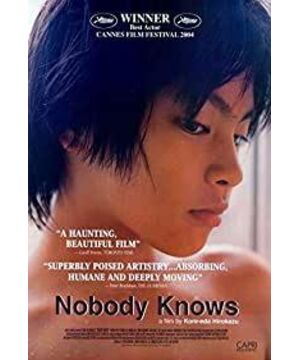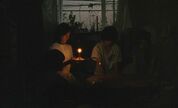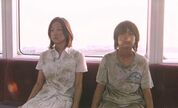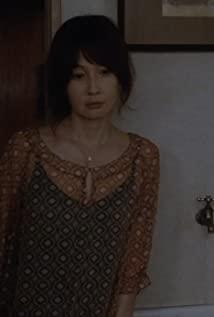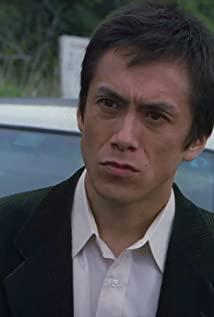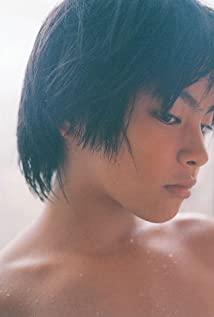In fact, at the beginning of the movie, I thought of Ian McEwan's first novel "The Cement Garden". The four children after the death of their parents became prisoners of the cement garden in the isolated island of their own house. They depended on each other for life. The world is trying to maintain the integrity of the family, and the way they finally choose is the union of the eldest daughter and the eldest son to become a veritable new father and mother. Of course, Mike Ewan didn't just want to tell a story of incest between siblings. The influence of the lack of parental image on children's growth and the understanding and imitation of social structure by self-learning ability are all permeated in the monologue-style narrative. Unlike Mike Ewan's Western style's straightforwardness of emotion and sexuality, and the arrogant and bold words brought about by mania, in the somewhat similar subject matter, it is Hirokazu-eda's typical oriental style. Introverted and calm about feelings, with calm and even a little emotionless shots, it brings me a scene that seems cold and indifferent, but I can't suppress the coexistence of haze and warmth in my heart, like a war, but strange fusion. image memory.
The restraint and restraint of his shots will make you feel at first that he is not criticizing the parents who abandoned their children, nor is he flogging passers-by who have no caring heart, nor is he angry with such a social reality. His camera lens seems to be completely emotionless, just recording, with each detail and environment, recording the four children's time in a year, how autumn, winter and spring and summer alternate, how hair grows, how clothes become ragged, red nails How the oil becomes dull, how the room becomes filthy, and how the life is lost. But gradually you will discover this paradox, that is, how ruthless the shot is, the image is carved into your heart as if it has vitality, so that you cannot be as calm as the shot. Gradually, you will find that you have entered this image, the falling cherry blossoms seem to fall on your palm, and something in your heart is also after the plane flew over the small grave in the desolate land, forever. of lost.
It was Hirokazu Koreeda's dedication to the simplicity of the soundtrack and the real ambient sound that made the sense of substitution even more intense. A scene that impressed me deeply. After Ming got rid of the money made by Saki's aid dating, he was frustrated and ran wild on the street, a little hypocritical. The director will definitely add some sensational music here, such as expressing his confusion at the moment with self-admiring ones, and expressing his despair with Leave (by REM), etc., but it is Hirokazu Koreeda There were only real background sounds in this run, the babble of passersby, the sound of cars, the music of the shop, and Ming's uncontrollable bursts of breath. In fact, it is precisely this contrast. After Ming and Saki buried Xiaoxue, they were walking on the road with no one in the morning light, and the clear and gentle singing of Ryuko Zhen rang, and the touch was passed from the screen without any obstacle. The indescribable emotional shock is like a desperate rainstorm, soaking the whole body. When I want to sob, I look up and find the rainbow that reflects the quiet bloom of the sun's brilliance and the hope of life not far away. .
After watching the movie, I found the episode "Gem" sung by Ryuko, and I listened to it repeatedly in the middle of the night. No one can come near, stench of gems)". I suddenly thought of the tangled words that Nina and John said all their lives after reviewing "Monster", "You are all beautiful gems. Humans can become anything, so don't become monsters." But the monsters are always there, but sometimes I can't tell whether I was originally a monster or the world has slowly turned myself into a monster.
It was Hirokazu Koreeda who said the movie was based on a real case.
In January 1988, a mother in the Nishi-Sugamo area of Tokyo lived with her boyfriend, leaving her eldest son (14 years old) and three daughters aged seven, three and two at home. The four children have no household registration and do not go to school. Afterwards, the two-year-old daughter was beaten to death for stealing the cup noodles from the eldest son, who was hurt by his friend. In July of the same year, neighbors discovered that the house had only been living with children for a long time and called the police to report the incident. The two daughters were severely malnourished, and the body of the second son who died of illness was found. The mother, who was charged with abandoning and harming her children, was jailed for three years but suspended for four years before returning home with her two daughters, who were in the protection centre. The eldest son was charged with injuring the younger sister to death and abandoning the corpse, and was sentenced to a training center and officially enrolled in school for education.
In fact, his shots are generally optimistic, full of hope and gentle treatment of human nature, and they are also children abandoned by their mothers. If John in "Monster" is a fantasy extreme, "Nobody Knows" is a test of human nature. beautification. And the reality is precisely in the middle, in the summer morning no one knows, where should we go?
View more about Nobody Knows reviews


